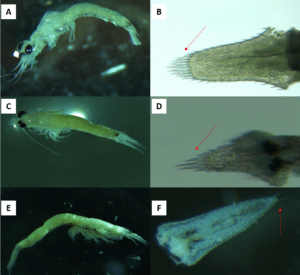RSVP HERE TO GET THE ZOOM DETAILS: https://marylandnature.wildapricot.org/event-4815376
What do you get when you cross a marsupial and a crustacean?
Mysids, small shrimp-like animals, are a little known but ecologically important part of Chesapeake Bay’s ecosystem. They are referred to as opossum shrimp due to the brood pouch present in the species’ females which sets the order apart from other crustaceans, whose larvae are free-swimming. But there is more to the mysids than the pouch. Although small (adult size is about the width of a human fingernail), mysids dominate the diet of many juvenile fish, from bottom-dwelling fishes such as flounders and drums to fast swimming predators like rockfish and bluefish.
Dr. Ryan Woodland, Associate Professor at the University of Maryland Center for Environmental Science will introduce us to the main species of mysids in the Chesapeake Bay, provide details on their ecology, and present recent research findings abundance, reproduction and diet of two of the most abundant species of mysid in the Bay, Neomysis americana.
Dr. Ryan Woodland, Associate Professor at the University of Maryland Center for Environmental Science will introduce us to the main species of mysids in the Chesapeake Bay, provide details on their ecology, and present recent research findings abundance, reproduction and diet of two of the most abundant species of mysid in the Bay, Neomysis americana.
Dr. Woodland is an ecologist at the University of Maryland Center for Environmental Science’s Chesapeake Biological Laboratory (CBL) whose research focuses on trophic interactions in coastal food webs and how environmental factors (often human-induced) influence species communities and their dynamics in coastal ecosystems. The core themes of Dr. Woodland’s research touch upon several broad areas of food web ecology, but they all inform our understanding of the processes that support the incredible productivity of estuaries and coastal marine ecosystems. Many of Dr. Woodland’s research projects are regionally focused on Chesapeake Bay and the larger Mid-Atlantic region, but the processes underlying these local patterns can inform our understanding of conditions in other ecosystems. Prior to coming to CBL, Dr. Woodland held postdoctoral fellowships in Canada (Université du Québec à Trois- Rivières) and Australia (Monash University, Victoria), and he maintains active collaborations with researchers from both countries. In addition to teaching and mentoring graduate students at CBL, he is engaged in supporting the professional development of undergraduate students pursuing careers in STEM fields through formal and informal internships. Dr. Woodland received his undergraduate degree in Marine Safety & Environmental Protection from the Massachusetts Maritime Academy and his Masters and PhD in Fisheries Science from the University of Maryland College Park.
RSVP HERE TO GET THE ZOOM DETAILS: https://marylandnature.wildapricot.org/event-4815376

